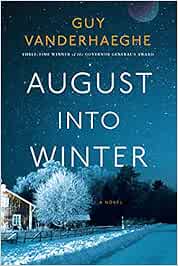4 Stars
I’ve always thought of Guy Vanderhaeghe as a master storyteller, and this novel certainly proves that he has not lost his touch, though a decade has passed since the publication of his last novel.
This book of historical fiction is set in Saskatchewan in 1939; as the title suggests, most of the events take place between August and November. Ernie Sickert brutally kills an RCMP police officer and thereby sets in motion a series of events with major consequences for several people. Making his escape, Ernie takes with him 12-year-old Loretta Pipe with whom he is besotted; one character describes “his kicked-in-the-head, dog-eyed adoration, a concentrated distillation of infatuation uncomfortable to witness.” A policeman in pursuit of Sickert enlists the help of Jack and Oliver Dill, two veterans of World War I. They make their way to the Clay Top School where they believe Sickert may have sought shelter and where Vidalia Taggart has recently arrived to take up the position of teacher. The encounters at the school change the lives of all those present.
Characters are well-developed with detailed backstories. Vidalia, for instance, is a fiercely independent woman who is grieving the recent death of her married lover in the Spanish Civil War. Jack is a sensitive man who was scarred by the war; he is subject to religious visions and is obsessed with writing a theological magnum opus. Oliver (Dill) is a stubborn and impetuous man who returned from the war filled with icy rage. He describes himself as sharing many traits with his beloved horses: “Their throbbing energy, their speed, their eye-rolling wariness and unpredictability . . . generosity of spirit.” He is grieving after the death of his wife Judith, a troubled woman who had befriended Ernie Sickert. Ernie was born to older parents who had wished to “remain blessedly and blissfully childless" and so ignored or appeased their only son who grew up with “a nose for vulnerability” and to be “a connoisseur of small and extreme cruelties.”
A major theme is that “You carried the past into the future on your back, its knees and arms hugging you tighter with every step.” All of the characters are affected by their pasts. Dill realizes that his wife Judith had been “crippled by experience” and so had hobbled through life. He is determined not to repeat the errors he feels he made in his marriage. Loretta is an orphan living with a married sister who has little time and patience for her, so her latching on to Sickert is understandable.
Certainly the long-lasting destructive effects of war are emphasized; Jack and Dill are different men when they return from the battlefields. Vidalia’s lover volunteers to fight in Spain and his experiences open his eyes and affect Vidalia when she reads about them in his journal. As events unfold in Saskatchewan, the world is preparing for war which Dill does not want to hear about because of “the half-truths and lies that are the camp followers of war” and “the pitiless indifference to human misery that is cousin to war.”
Another theme is that love can be redemptive. Though Sickert can best be described as a psychopath, his one positive quality is his love for Loretta. When he perceives that she has been unfairly treated, he is determined to do whatever is necessary to rescue her. Another character feels dead until love resurrects him. Dill summarizes, “When Dill thinks of the men, women, and children torn out of each other’s arms and cast adrift in this brutal war, people who ate and slept and worked and played in villages and farms that are names that he cannot pronounce, Dill is certain that the only thing that keeps these people putting one foot in front of the other in a world of starvation, fire, disease, loneliness, and the catastrophes of war is the certainty that if they don’t open their eyes tomorrow, if they don’t trudge on, they will never get home to the ones they love.”
I
love Vanderhaeghe’s writing style. As
the above quotations indicate, his use of language is eloquent. I appreciate having my vocabulary enlarged: “the debouchment of the ravine” and “a writer
manqué” and “let his bequest to her lie doggo” and “the marriage of phenomenon
and noumenon.”
At almost 500 pages, this is a lengthy book, but it has something for everyone. There is action, humour, and romance. My interest did not wane, especially because there is a great deal of suspense. Sometimes, the suspense is almost unbearable; just as the reader is repeatedly reminded that the world is moving inexorably towards war, the reader also knows that it is inevitable that there will be a cataclysmic encounter at the end.
I recommend this book to anyone who enjoys an interesting tale with memorable characters and thematic depth written with masterful skill.
Note: I received a digital galley from the publisher via NetGalley.

No comments:
Post a Comment